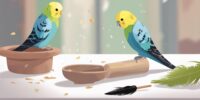How to Recognize Common Health Issues in Parrots by Species
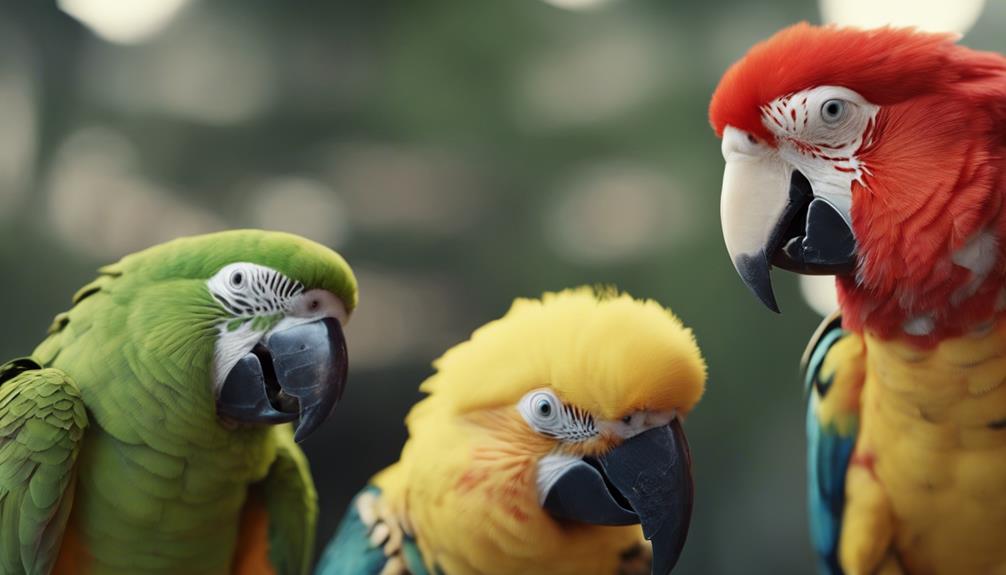
Common Health Issues in Parrots by Species:
Learn to recognize and address unique health challenges for each parrot species to ensure your feathered friend's well-being.
Overview of Parrot Health
The health of parrots is a complex and multifaceted aspect that requires careful observation and understanding by their caregivers. Preventative care is essential in maintaining the well-being of parrots. Regular check-ups with avian vets can help detect any health issues early on, ensuring prompt treatment and a higher chance of recovery. Avian vets are specialized in bird care and can provide valuable insights into the specific needs of parrots.
Parasite detection is crucial in preventing serious health issues in parrots. Regular screenings can help identify and treat parasites before they cause harm. Furthermore, feather plucking is a behavior that can indicate underlying health problems or psychological distress in parrots. Caregivers should closely monitor their parrot's plumage and behavior to detect any signs of feather plucking early on.
African Grey Parrots
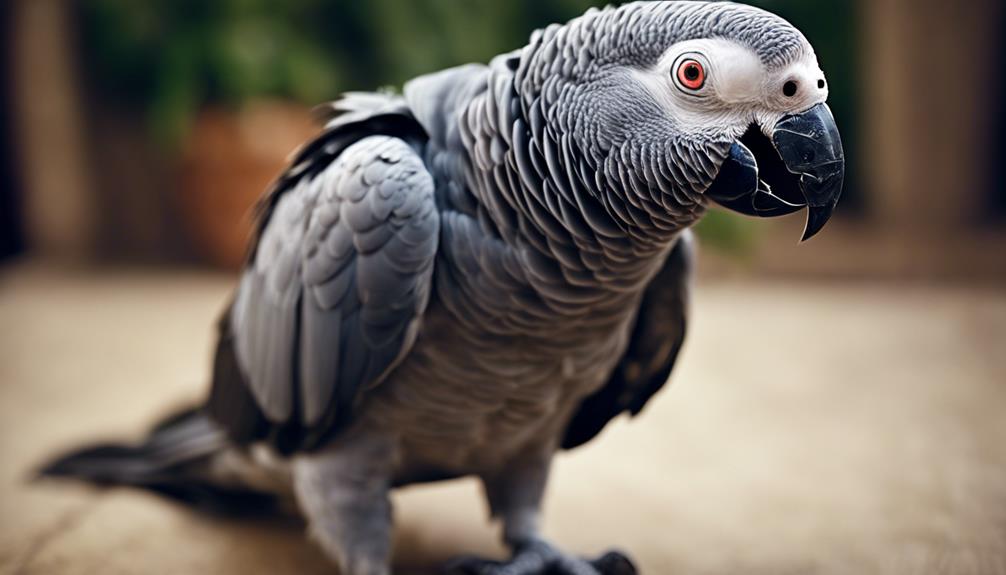
Parasite detection and feather plucking are critical aspects of maintaining the health of African Grey Parrots. These intelligent birds are prone to stress-related behaviors such as feather plucking, which can indicate underlying health issues or environmental stressors. To address this, behavior modification and training techniques can be implemented. Positive reinforcement methods, like clicker training, can help redirect their focus and prevent destructive behaviors.
In addition to behavioral issues, African Grey Parrots require enrichment activities and socialization tips to thrive. Providing toys that encourage foraging, puzzle-solving, and physical exercise can keep them mentally stimulated and prevent boredom. Socialization with their human companions is also crucial for their emotional well-being. Spending quality time interacting with them, talking, and providing affection can strengthen the bond between the parrot and its owner.
Cockatiels

Detecting early signs of illness in Cockatiels is crucial for maintaining their health and well-being. Cockatiels are popular pet birds known for their playful nature and charming personalities. Proper feather care and grooming are essential aspects of keeping your Cockatiel healthy and happy. Regularly check their feathers for any signs of damage, matting, or discoloration, as these can indicate underlying health issues. Additionally, providing a balanced diet rich in nutrients will help maintain their plumage in top condition.
When it comes to Cockatiel training and behavior, consistency is key. These intelligent birds respond well to positive reinforcement techniques, such as clicker training and treats. Cockatiels thrive on mental stimulation, so incorporating toys and interactive activities into their daily routine can prevent boredom and behavioral problems. Understanding your Cockatiel's body language and vocalizations is also crucial in addressing any potential issues early on.
| Aspect | Description | Importance |
|---|---|---|
| Feather Care | Regularly inspect feathers for signs of damage | High |
| Grooming | Provide baths and nail trims as needed | Moderate |
| Training & Behavior | Use positive reinforcement for effective training | High |
Macaws
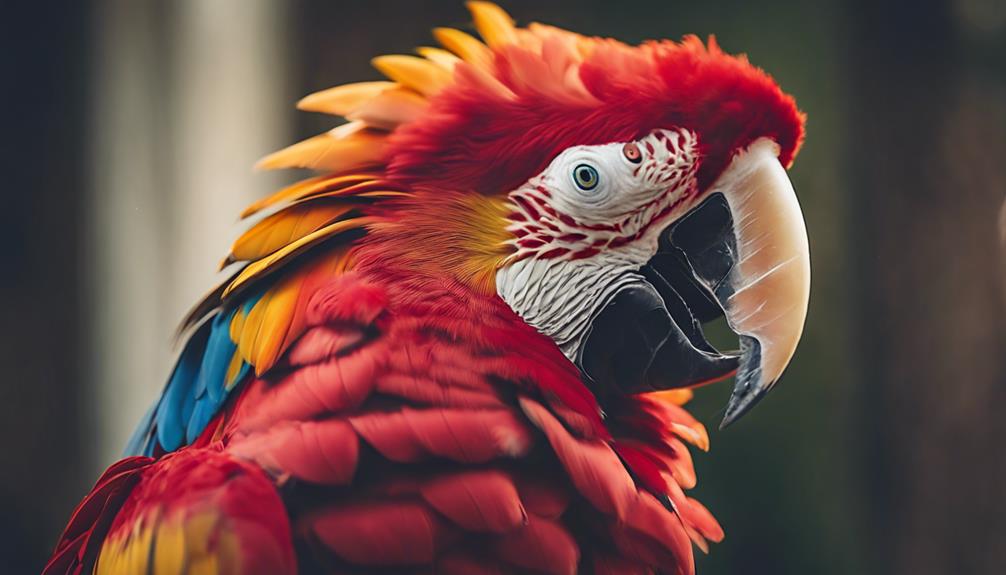
Regularly monitoring the diet and foraging habits of Macaws is essential for ensuring their nutritional needs are met and promoting their overall well-being. Macaws are intelligent and social birds that thrive on mental stimulation and interaction. To keep them healthy and happy, consider the following tips:
- Macaw enrichment activities: Provide toys that encourage problem-solving, such as puzzle feeders or foraging toys. Rotate their toys regularly to prevent boredom and stimulate their curiosity.
- Macaw grooming tips: Regularly check their beak and nails for overgrowth and trim them if necessary. Ensure they have access to bathing opportunities to maintain healthy feathers and skin.
- Social interaction: Spend quality time with your Macaw daily to build a strong bond and prevent loneliness.
- Nutrition: Offer a balanced diet of fruits, vegetables, nuts, and high-quality pellets to meet their nutritional requirements.
- Regular veterinary check-ups: Schedule annual check-ups with an avian vet to monitor their health and catch any potential issues early on.
Lovebirds
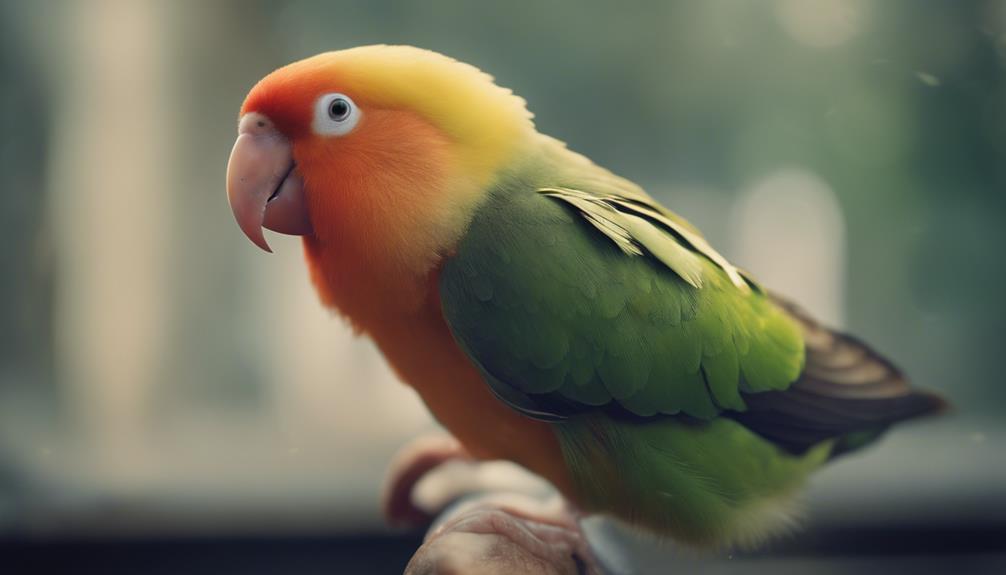
Lovebirds, known for their vibrant plumage and affectionate nature, require specific care to ensure their health and well-being. Lovebird bonding behavior is a crucial aspect of their care. These small parrots form strong bonds with their owners or other lovebird companions, often displaying signs of distress when separated. It's essential to provide them with plenty of social interaction and mental stimulation to prevent loneliness and ensure their emotional well-being.
Lovebirds are prone to feather plucking, a behavior that can indicate underlying health issues or stress. If a lovebird is excessively plucking its feathers, it's vital to investigate the potential causes, such as poor diet, lack of mental stimulation, or parasitic infections. Seeking advice from an avian veterinarian is recommended to address any health concerns promptly.
Budgerigars

Budgerigars, commonly known as budgies, have specific dietary needs that must be met for optimal health. Understanding what these small parrots require in terms of nutrition is essential for their overall well-being.
Recognizing signs of illness in budgerigars is crucial for prompt intervention and treatment.
Budgie Dietary Needs
What dietary requirements are essential for maintaining the health of budgerigars?
Budgies have specific dietary needs that are crucial for their overall well-being. When it comes to feeding these small parrots, their diet should be carefully balanced to ensure optimal health. Here are some key points to consider:
- Seed vs. pellet: While seeds are a common choice, pellets can provide a more balanced diet.
- Fresh vs. dried fruits: Fresh fruits offer higher nutritional value compared to dried fruits.
- Green vegetables: Incorporating fresh greens like spinach and kale is essential for a well-rounded diet.
- Cuttlebone: This natural source of calcium helps maintain their beak and bones.
- Limited treats: Treats like millet should be given sparingly to prevent nutritional imbalances.
Signs of Illness
Recognizing signs of illness in budgerigars is crucial for promptly addressing potential health issues and ensuring the well-being of these small parrots.
When observing budgies, pay close attention to their feather condition; any signs of disheveled, puffed-up feathers may indicate sickness.
Additionally, sudden weight changes can be a red flag.
Changes in their activity level, such as increased lethargy or unusual behavior, are also important to note.
Keep an eye on their appetite fluctuations; a decrease or increase in eating habits could signify an underlying problem.
Monitoring these key indicators regularly can help you catch any health issues early and provide the necessary care to keep your budgerigar happy and healthy.
Conures
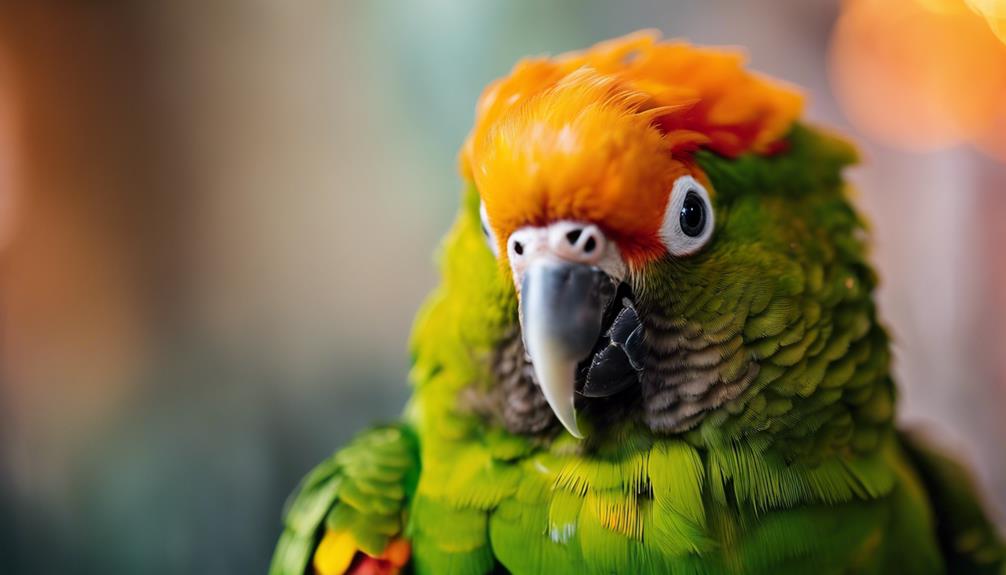
Conures have specific dietary needs that must be met to ensure their overall health and well-being.
Their vocalizations can provide valuable insights into their mood, health, and level of comfort in their environment.
Additionally, behavioral issues such as feather plucking and aggression are common in conures and should be addressed promptly to prevent further complications.
Conures' Dietary Needs
Understanding the dietary requirements of Conures is crucial for ensuring their overall health and well-being. Conures thrive on a balanced diet that includes a variety of fresh fruits, vegetables, high-quality pellets, and occasional seeds as treats. It's essential to provide them with a diverse range of nutrients to support their vibrant plumage and energetic personalities.
Additionally, Conures benefit from regular access to clean water and the occasional supplementation of vitamins and minerals. To enhance their feeding experience and promote natural behaviors, consider incorporating foraging toys and puzzle feeders into their daily routine. By meeting their dietary needs and providing behavioral enrichment, you can help keep your Conures happy and healthy for years to come.
- Fresh fruits and vegetables
- High-quality pellets
- Occasional seeds as treats
- Clean water
- Foraging toys and puzzle feeders
Conures' Vocalizations
Having addressed the dietary needs of Conures, it is crucial to now explore the intricate world of their vocalizations to better understand their communication patterns and behaviors. Conures are known for their diverse vocalization patterns, which can include squawking, chirping, and even mimicry of sounds they hear in their environment. These vocalizations are essential for socialization among Conures and can convey various emotions and messages. To enhance these communication skills, training techniques such as positive reinforcement can be employed. Providing enrichment opportunities like toys that make noise or playing recordings of other birds can also help stimulate their vocal abilities. Understanding and responding to a Conure's vocalizations can strengthen the bond between the bird and its owner.
| Vocalization Patterns | Socialization | Training Techniques |
|---|---|---|
| Squawking | Important for bonding | Positive reinforcement |
| Chirping | Communicating emotions | Interactive playtime |
| Mimicry | Learning from others | Audio stimulation |
Conures' Behavior Issues
Exploring common behavior issues in Conures reveals insights into their social dynamics and environmental interactions. Conures, known for their vibrant personalities, may exhibit behavior problems that can be managed with the right approach.
Here are some tips to address behavior issues in Conures:
- Training Tips: Positive reinforcement techniques can be effective in training Conures to overcome behavioral challenges.
- Socialization Techniques: Regular interaction with humans and other birds can help Conures develop appropriate social skills.
- Environmental Enrichment: Providing toys and activities that stimulate their minds can prevent boredom-related behavior problems.
- Consistent Routine: Establishing a predictable daily routine can help Conures feel secure and reduce stress-induced behaviors.
- Professional Guidance: Consulting with an avian veterinarian or bird behaviorist can offer specialized advice for addressing specific behavior issues.
Frequently Asked Questions
Can Parrots Be Trained to Alert Their Owners of Potential Health Issues?
Parrots can be trained to alert their owners of potential health issues. Training benefits include improved communication cues from the bird. This helps owners increase their awareness of health alerts, ensuring timely intervention for their pet's well-being.
What Is the Average Lifespan of Different Parrot Species and How Does It Impact Their Health?
Different parrot species exhibit lifespan variations impacting their health. Species-specific longevity influences health factors like diet, exercise needs, and common ailments. Understanding these differences aids in providing tailored care to ensure optimal health and wellbeing.
Are There Any Specific Seasonal Health Issues That Parrot Owners Should Be Aware Of?
Seasonal illnesses in parrots can be triggered by environmental factors affecting their immune system. Owners should watch for behavior changes during these times. Ensuring proper nutrition and a stress-free environment can help prevent issues.
How Can a Parrot's Diet Impact Their Overall Health and Potential Health Issues?
A parrot's diet directly impacts their health. Nutritional imbalances can lead to digestive issues, affecting feather quality and causing behavior changes. Owners must provide a well-rounded diet to ensure their feathered friends stay healthy and vibrant.
Are There Any Preventative Measures That Can Be Taken to Help Maintain a Parrot's Health?
To maintain a parrot's health, it's crucial to implement regular vet checkups, provide environmental enrichment, incorporate exercise routines, and consider nutritional supplements. These practices can help prevent common health issues and ensure overall well-being.

